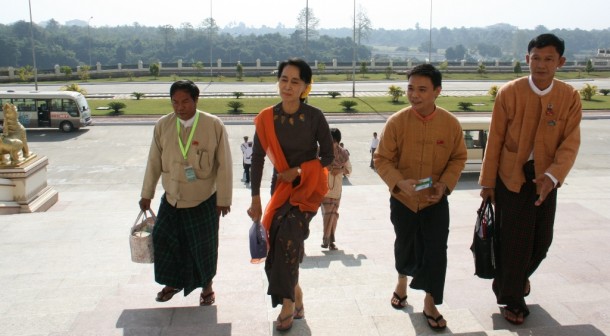RANGOON — Representatives from human rights groups that are against quartet of proposed laws aimed at “protecting race and religion” are due to meet with members of Burma’s Rule of Law Committee, a parliamentary body chaired by opposition leader Aung San Suu Kyi.
The meeting on Wednesday in Naypyidaw will include 10 members of the rights groups that have spearheaded a campaign in opposition to the bills. Suu Kyi is likely to be present at the meeting, according to Zin Mar Aung of the Rainfall Gender Study Group, who will be among the representatives to meet with the committee.
Late last month, the Burmese government published a religious conversion bill in state-run newspapers and solicited public feedback. It is one of four bills that the government has drafted at the instigation of radical Buddhist monks who have been campaigning for the protection of race and religion. Leaders of the campaign circulated a petition in support of the proposals that has gathered 1.3 million signatures.
The other three bills contemplate restricting interfaith marriage, birth rates and polygamy.
The bills have been opposed by more than 100 human rights groups that see the legislation as restrictive, undemocratic and in violation of women’s rights. Women speaking up in opposition to the proposed legislation have received anonymous death threats.
“We will discuss the reasons behind the conversion bill, the threats we received and raise our concerns about those bills from a human rights point of view,” Zin Mar Aung told The Irrawaddy.
The 15-member committee was founded two years ago by Parliament and it is the first government body to engage with the rights groups on the issue.
Since the bills were put forward last year, more than 100 human rights groups have demanded meetings with senior government officials including Burma’s President Thein Sein and Union Parliament Speaker Shwe Mann to lodge their concerns, but their overtures so far appear to have fallen on deaf ears. Thein Sein’s government has taken the initiative in drafting the bills, and Shwe Mann has said little publicly on the matter.

















